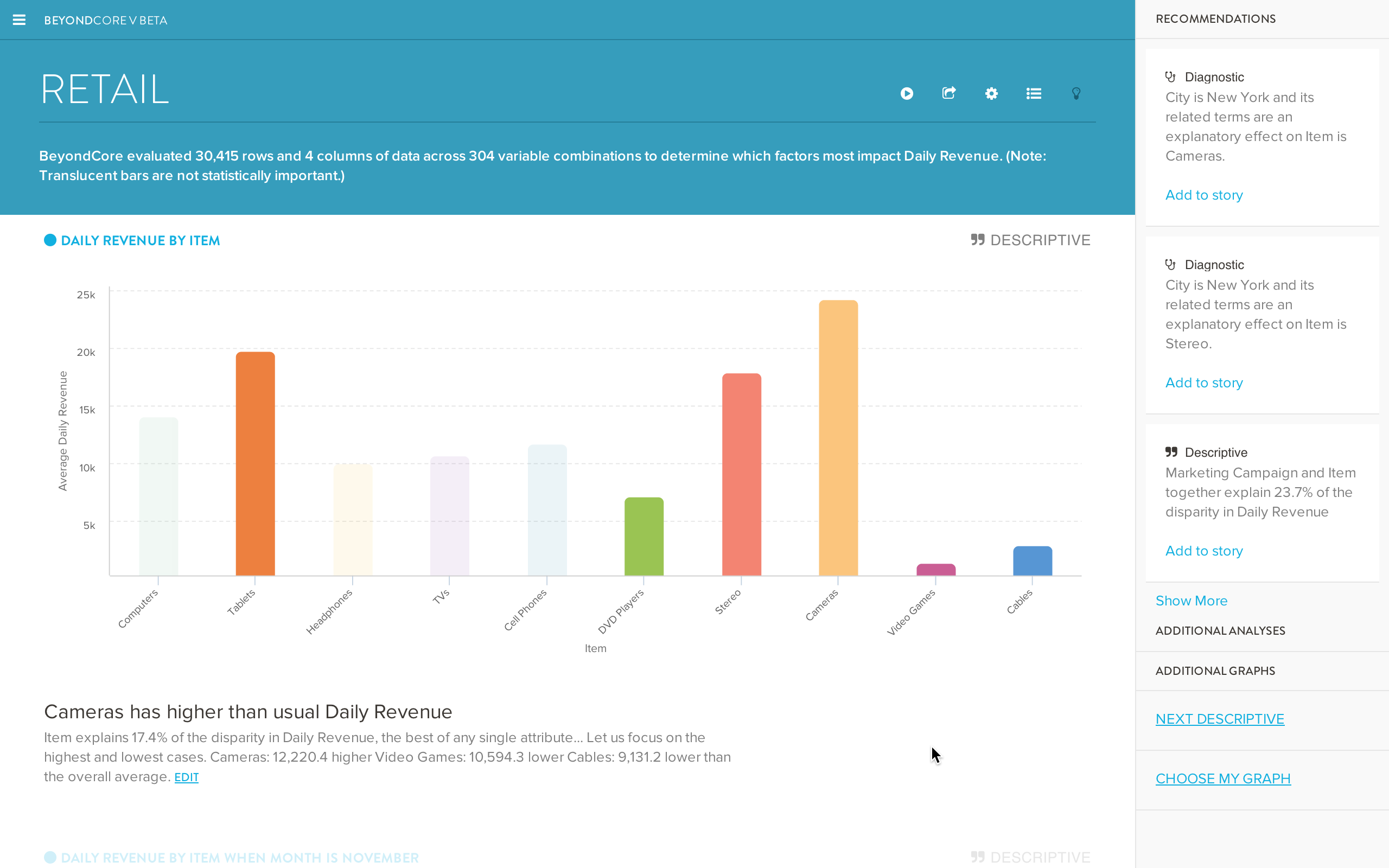There is an intrinsic problem with analytics software. A conundrum that can’t be solved by simply making products and solutions that are easier to use. In fact, putting analytics in the hands of everybody actually exacerbates the problem.
What questions do you ask in order to get meaningful results for your business?
I talked with Arijit Sengupta, CEO of BeyondCore, who — after ten years of research and development — has launched today a new solution that tries to circumvent not only that issue, but other analysis problems that face business owners and managers.
While these solutions have never been on the sexier side of marketing technology, analytics tools have had a surge of interest lately largely thanks to the launch of Salesforce Wave. Indeed, business intelligence is clearlysomething everyone wants more of these days.
“Analytics is important,” Sengupta said. “It needs to be in the hands of the business user, and that is exactly what Salesforce is trying to achieve.”
He’s right, and the tools Salesforce showed during Dreamforce this year make everything look simple, easy, and ‘app-like’. But as I used to say to my potential customers back in 1987 when showing them Ventura Publisher, “having a desktop publishing package doesn’t make you a desktop publisher.”
And having an analytics solution in the palm of your hand doesn’t make you an analyst. Or a data scientist.
“Other people in this marketplace are giving everyone the tools that allow you to ask questions, but it means that everyone has to think of the right questions to ask,” Sengupta said. “The problem here is that there are hundreds of thousands of potential questions.”
Sengupta showed me a demonstration of what BeyondCore can do.
Want the latest marketing technology research?
Get VB Insight’s State of Marketing Technology Report.
Taking in semi-structured data from databases, tables, and other sources, such as Hadoop or SAP HANA, BeyondCore needs to know what value you want to map.
For example, you may want to analyze ‘daily revenue’ to look at what happened, why it happened, and if there areways to increase sales across your business.
Having seen many business intelligence and analytics solutions over the years, I wasn’t quite prepared for what happened next.
“Right now, BeyondCore is asking millions of questions behind the scenes for you,” Sengupta said. “In a few moments, it will show you not only the results of those simulations, but it will determine which were important.”
And it did exactly that, right in front of my eyes.
After a few seconds I was presented with twelve graphs. It had processed the data without interruption or further interaction and produced an entire management briefing, on the spot.
But these aren’t just regular graphs. The software had also written out explanations as to why it had chosen those particular charts and why they were important.
In fact, BeyondCore can read the report it has created out loud to you using a text-to-speech engine. You can adjust the auto-generated commentary to add in your own insights, share the results with your team and ask the system to generate new analysis based on any of the auto-generated outcomes, helping you and your colleagues dive deeper into the analysis.
For example, I could see that — in this demo data at least —amarketing campaign accounted for 33percentof the increase in sales of mobile phones, whereas the rest of the uplift was completely seasonal in nature. That’s the kind of insight you might miss with standard reporting and attribution.
“If you look further down the report, BeyondCore has made some predictions to help drive more revenue from the business,” Sengupta said.
Sure enough, another chart showed that the increase in November was almost entirely due to mobile advertising in the New York branch, whereasother branches didn’t respond to that marketing channel at all.
BeyondCore is designed to show descriptive charts (what happened), diagnostics (why it happened), predictive models (what will happen next), and prescriptive graphs (how to improve things).
Of course, knowing the right questions to ask of any analytics system is one issue, and BeyondCore’s unique approach to avoiding that entirely is impressive. There are other problems too.
“Producing and interpreting graphs and charts isn’t something everyone can do,” Sengupta said. “But a much bigger problem for anyone working with large amounts of data is how you determine and allow for statistical issues, such as confounding effects and low-quality correlations.”
AsBeyondCore runs its millions of simulations, it removes questions, charts, and data-sets that fail statistical analysis behind the scenes before they even make it to the front page.
Of course, BeyondCore isn’t for everyone and won’t work with every type of data. It needs semi-structured data as an input, and it also requires a minimum of 10,000 rows of information. As such, it is more suited to B2C organizations or those that produce high volumes of transactional data.
But for the companies it does suit, BeyondCore is the first analytics solution I’ve seen that puts useful business data in the hands of those that need it most — the managers and owners — without expecting them to become data scientists overnight. Or even know what questions to ask.
VentureBeat's mission is to be a digital town square for technical decision-makers to gain knowledge about transformative enterprise technology and transact. Learn More



